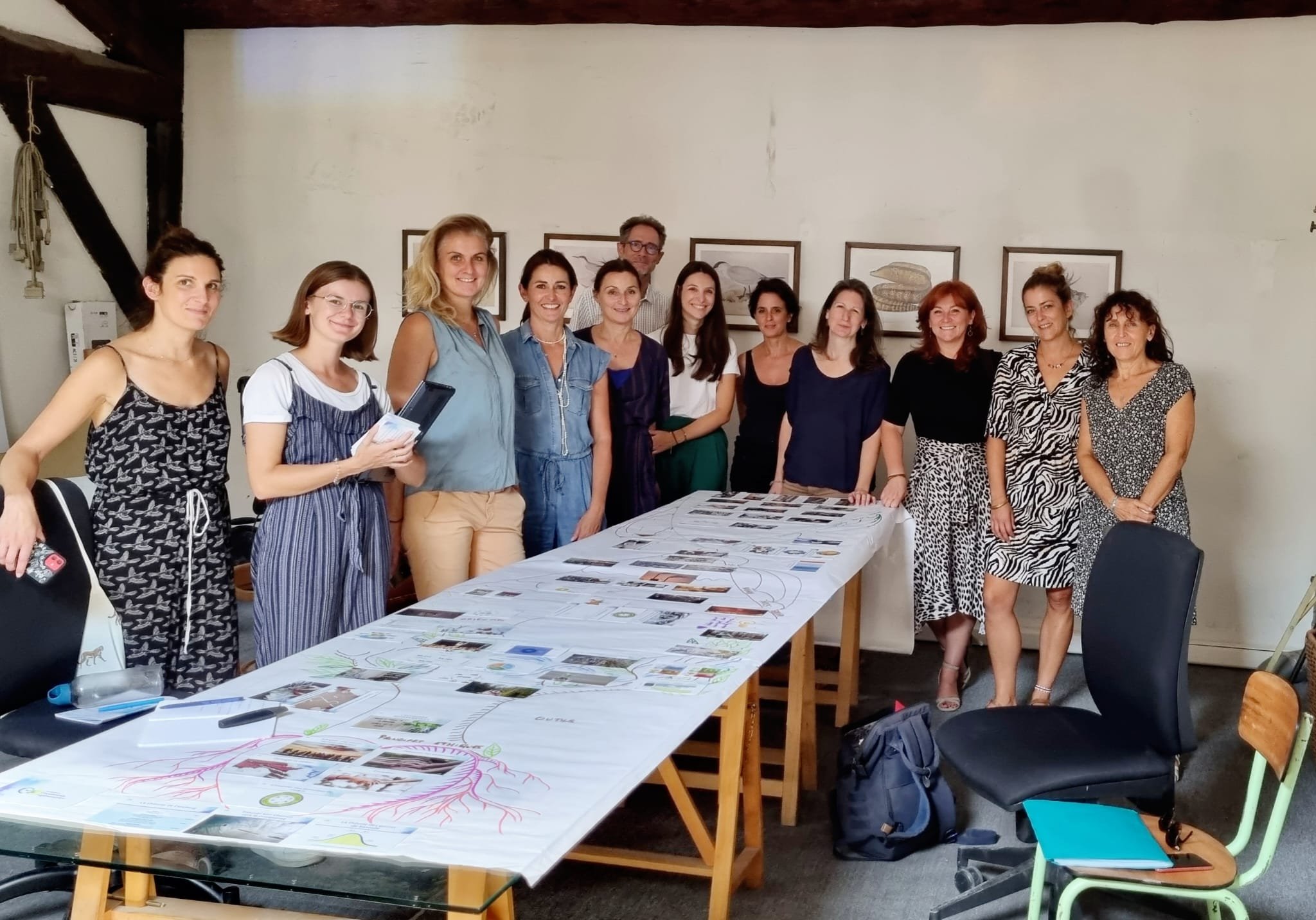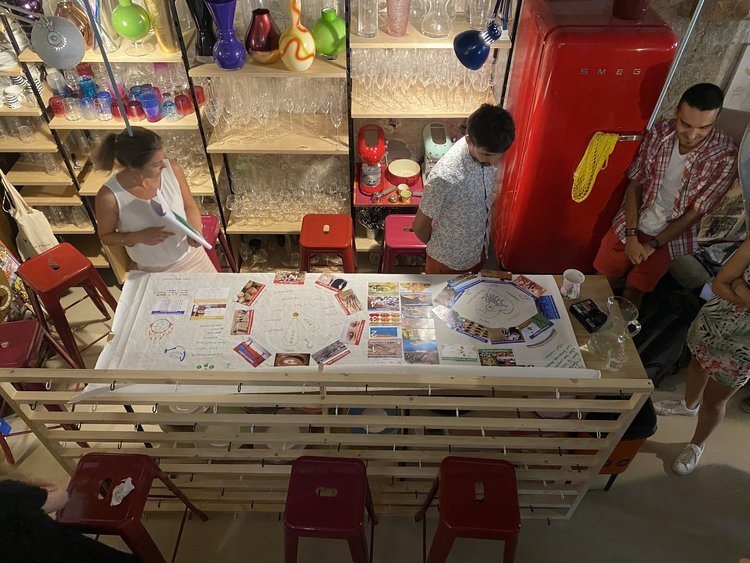Regenerative Economy Workshop
What is Regenerative Economy
Regenerative economy represents an innovative and holistic approach to economic development that goes beyond mere sustainability. In contrast to traditional models, regenerative economy aims to restore and revitalize natural systems rather than exploit them exhaustively. This approach emphasizes creating a positive impact on the environment, society, and the economy. In other words, it seeks to regenerate rather than deplete, to create systems that improve over time rather than degrade.
Regenerative economy is built on fundamental principles such as ecosystem restoration, promotion of biodiversity, and encouragement of sustainable innovation. It seeks to establish a dynamic balance between human activities and natural cycles, fostering a harmonious coexistence between humans and nature.
At the core of this philosophy emerges the collage of the regenerative economy, an approach inspired by Permaeconomy. Designed by Emmanuel Delannoy, author of "L'Economie expliquée aux humains," and Séverine Fantapie, a biologist and facilitator of the Biodiversity Collage, this workshop is not merely a visual representation; it is a gateway to a deep understanding of this holistic approach.
What is a Regenerative Economy workshop?
The regenerative economy workshop is an integrative model that provides a comprehensive view of this holistic approach. It functions as a visual and systemic representation of the principles, practices, and goals of regenerative economy. This collage acts as a conceptual map, highlighting the complex links between different aspects of regenerative economy and demonstrating how they interact to create a cohesive system.
By using the metaphor of the collage, the need for adopting an artistic and collaborative perspective in building a regenerative economy is illustrated. Each element of the collage represents a crucial aspect, whether it's regenerative agriculture, renewable energy, circular economy, or other essential components. By combining these elements harmoniously, the collage portrays a powerful image of how a regenerative economy can be created, promoting long-term sustainability and the regeneration of natural systems.
In summary, the regenerative economy workshop offers a captivating and educational visual representation that facilitates the understanding and adoption of this innovative approach. It plays a vital role in illustrating how each piece of the puzzle fits together to form a comprehensive picture, thereby encouraging the implementation of more responsible and sustainable economic practices.
How Does a Regenerative Economy Collage Workshop Work?
The regenerative economy workshop goes beyond theory to become a tangible exploration tool. The 3-hour workshops offered by this collage, led by experienced facilitators, invite participants to reflect on the current functioning of the economy, its limitations, and to discover the guiding principles that pave the way for a balanced societal model between planetary boundaries and social needs. These workshops provide a hands-on immersion into economic regeneration, encouraging deep reflection and concrete actions.
Pillars of Regenerative Economy
The workshops of the regenerative economy collage are much more than a simple gathering: they offer an immersive dive into the key principles that define this innovative approach. Based on a participatory and interactive methodology, these workshops aim to deconstruct traditional thought patterns and pave the way for a deep understanding of the foundations of regenerative economy.
A. RESTORING INSTEAD OF CONSUMING
One of the fundamental principles of regenerative economy is to prioritize the restoration of resources rather than their mere consumption. Unlike traditional economic models that focus on the massive extraction and use of natural resources, regenerative economy seeks to rehabilitate and repair ecosystems. This involves implementing sustainable agricultural practices, rehabilitating degraded soils, and protecting water resources. The idea is to create virtuous cycles where human activities contribute to the regeneration of natural systems, fostering a more balanced coexistence between humans and the planet. This approach emphasizes the importance of transitioning from a resource-depleting consumption model to a model focused on ecosystem restoration. Workshop participants explore how this transition can be implemented through real-life examples of businesses and projects adopting this restorative mindset. Discussions focus on minimizing ecological footprints while promoting the regeneration of natural resources.
B. PROMOTING DIVERSITY AND RESILIENCE
Another key pillar of regenerative economy is the promotion of diversity and resilience. Workshops encourage in-depth reflection on how economic monoculture can be transformed into a diverse economic ecosystem. By exploring inspiring case studies, participants discover how diversity, whether in agriculture, businesses, or economic models, contributes to strengthening resilience in the face of economic and environmental challenges.
C. ENCOURAGING COLLABORATION AND INCLUSION
Collaboration and inclusion are essential pillars of regenerative economy. Workshops highlight how cooperation among different stakeholders, whether businesses, communities, or organizations, can catalyze significant changes. Inclusion, on the other hand, is explored as a means to ensure that the benefits of economic regeneration are shared equitably. Detailed case studies underscore how inclusive initiatives have a positive impact on local communities while fostering a regenerative economy on a global scale.
By participating in these workshops, individuals are immersed in an active learning process, discovering not only the theoretical principles but also how to apply them concretely in various contexts. These enriching interactions contribute to forming a community of conscious and engaged actors in the promotion of regenerative economy."
Benefits of Adopting Regenerative Economy
ENVIRONMENTAL IMPACT
Conservation of Aquatic and Terrestrial Ecosystems
Regenerative economy, going beyond soil revitalization, actively engages in the preservation of aquatic and terrestrial ecosystems. Through the adoption of innovative practices, it works towards protecting marine habitats, restoring wetlands, and regenerating forests. Workshops on the regenerative economy collage illustrate concrete examples where this approach has led to biodiversity preservation and the creation of more resilient ecosystems.
Promotion of Sustainable Mobility and Green Infrastructure
In addition to its impact on natural environments, regenerative economy highlights sustainable mobility and the establishment of green infrastructures. Workshops explore concrete examples where the use of low-emission transportation is at the core of the regenerative vision. Furthermore, the design of sustainable cities, with green spaces and ecological corridors, is encouraged to foster urban regeneration. These initiatives contribute to reducing greenhouse gas emissions related to travel while creating healthier urban environments.
ECONOMIC ADVANTAGES
Creation of Sustainable Jobs
Regenerative economy also presents itself as a driver for the creation of sustainable jobs. Workshops delve into how initiatives aiming at environmental restoration, such as tree planting, soil regeneration, and the deployment of renewable energy, significantly contribute to the generation of local and sustainable employment. These job opportunities are not confined solely to traditional sectors but also extend to emerging fields, thereby stimulating a diverse and skilled workforce to meet the needs of the transition towards a regenerative economy.
Stimulation of Innovation and Competitiveness
Regenerative economy stimulates innovation and enhances the competitiveness of businesses adopting these models. Workshops highlight cases where companies have thrived by integrating sustainable practices, encouraging innovation in product design, resource management, and business models. Competitiveness is no longer measured solely by financial profitability but also by the ability to contribute positively to the environment and society.
In summary, workshops on the regenerative economy collage provide a deep understanding of the tangible benefits resulting from this transition. The positive impact on the environment and concrete economic benefits make the adoption of regenerative economy a promising path towards a more sustainable and resilient future.
Regenerative Exploration: Beyond Economy with Natural Solutions
At Natural Solutions, our commitment to regeneration goes beyond the regenerative economy workshop. We also explore other crucial dimensions through collages such as the Biodiversity Collage and the Digital Collage. These complementary initiatives allow us to deepen our understanding of the interconnections between biodiversity, technology, and the economy, shaping a comprehensive approach to regeneration.
Our workshops on the Biodiversity Collage immerse us in the vital understanding of biodiversity's importance for the overall health of our planet. We explore the links between ecosystems, biological diversity, and the impacts of our activities on these delicate systems. Simultaneously, the Digital Collage prompts us to reflect on how technology can be a driver of regeneration by fostering innovative and sustainable solutions.
This diversity of collages at Natural Solutions reflects our ongoing commitment to exploring holistic perspectives and catalyzing positive changes in every facet of our business. We share this vision beyond our teams by offering open workshops, thus raising awareness among a broader audience about the need for regeneration in our economic and environmental practices. By integrating them into our comprehensive approach, we aspire to play an active role in the transition to a future where regeneration guides every aspect of our actions.
Would you like to learn more about workshop collages in general? Contact us!"
















